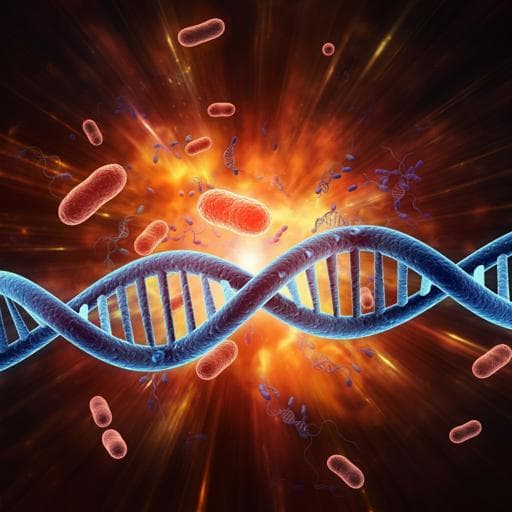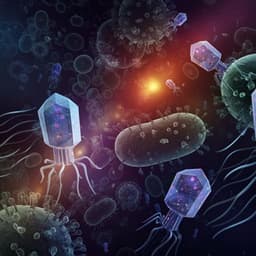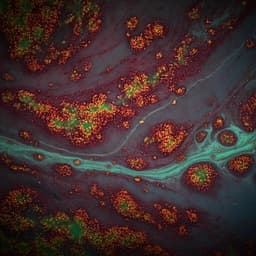
Medicine and Health
Antidepressants promote the spread of extracellular antibiotic resistance genes via transformation
J. Lu, P. Ding, et al.
Antibiotic resistance is a global public health threat responsible for over 1.3 million deaths annually. Beyond mutation and antibiotic pressure, horizontal gene transfer (HGT)—via conjugation, transduction, and natural transformation—plays a critical role in disseminating antibiotic resistance genes (ARGs). Transformation enables competent bacteria to uptake, integrate, and express extracellular DNA released from dead or damaged cells, allowing ARGs to spread even after antibiotic-killed donors lyse. Natural transformation contributes to adaptation in human pathogens. While sub-inhibitory antibiotics are known to accelerate resistance development and HGT, non-antibiotic pharmaceuticals such as antidepressants are widely consumed and persist in the body and environment, exposing microbiomes to these compounds. Recent work showed fluoxetine induces reactive oxygen species (ROS) and mutation-based multidrug resistance in Escherichia coli, but whether antidepressants promote ARG dissemination via HGT is unclear. This study tests the hypothesis that commonly prescribed antidepressants enhance the horizontal transfer of ARGs by increasing natural transformation rates, and investigates the underlying mechanisms linking antidepressant exposure to ROS generation, membrane permeability, and competence pathways.
Model system: Natural transformation assays used Acinetobacter baylyi ADP1 as the recipient, a competence-deficient mutant (ΔrecA::cat) and a competence machinery knockout (comFEBC) strain for validation, and plasmid pWH1266 (pBR322-derived, 8.6 kb) carrying tetA (tetracycline resistance) and blaOXA-51 (ampicillin resistance) as extracellular DNA. Escherichia coli DH5α served for plasmid propagation and as a growth control. Culture and preparation: Bacteria were grown in LB broth (A. baylyi at 30 °C; E. coli at 37 °C). Plasmid DNA was purified using commercial miniprep kits. Antidepressants tested: duloxetine, sertraline, escitalopram, fluoxetine, bupropion, and agomelatine (all from Sigma Aldrich). Stock solutions were prepared in sterile water. Competent A. baylyi cultures were prepared and adjusted to target OD prior to transformation. Transformation assays: 500 µL reactions contained ~10^4 cfu/mL A. baylyi ADP1 and donor plasmid (final 0.8–1 ng/µL). Antidepressants were added across 0.01–100 mg/L. Incubation proceeded without shaking at 25 °C (30 °C for E. coli where applicable) for 6 h. Selective plating was done on LB agar with tetracycline (5 µg/mL) and ampicillin (100 µg/mL) to enumerate transformants after 48 h; non-selective plates quantified total recipients. Transformation ratio was transformants divided by total recipients, normalized to untreated controls to derive fold change. ROS dependency tests: Parallel assays were conducted (n = 9) under anaerobic conditions and with a ROS scavenger (thiourea; concentration indicated as 100 µM in figure descriptions) to suppress oxidative stress. ROS levels and transformation outcomes were measured under these conditions. Measurements: Minimum inhibitory concentration/IC50 shifts for recipients vs. transformants to ampicillin and tetracycline verified successful acquisition of resistance. Intracellular ROS was quantified using DCFDA by flow cytometry (CytoFLEX). Cell membrane permeability was assessed via propidium iodide staining and flow cytometry after 6 h exposure. Live/dead staining (LIVE/DEAD BacLight) quantified viability across antidepressant doses. Molecular verification: Plasmid DNA from transformants was extracted and PCR-amplified targeting tetA and blaOXA-51 to confirm acquisition; gel electrophoresis compared donor plasmid and transformant amplicons vs. recipients. Transcriptomics and proteomics: For transcriptional responses, biological triplicate 5 mL assays were treated for 2 h with selected doses (e.g., 10 mg/L duloxetine; 1 and 10 mg/L sertraline; 10 mg/L escitalopram; 100 mg/L fluoxetine; 100 mg/L bupropion; 50 mg/L agomelatine). Total RNA was extracted (RNeasy), strand-specific libraries prepared, and sequenced (Illumina HiSeq 2500). Differential expression was computed as log2 fold change of FPKM values vs. control. For proteomics, proteins were extracted (PEB), digested, and analyzed by LC-MS/MS (Thermo RSLCnano with Q-Exactive). Data were processed (Proteome Discoverer 2.2), with FDR < 0.01 for significant proteins; abundance ratios were calculated relative to controls. Statistics: Analyses used SPSS 27.0. ANOVA tested differences with Benjamini–Hochberg correction; significance at p < 0.05. Experiments generally included biological triplicates or n = 9 as stated.
• Four antidepressants—duloxetine, sertraline, fluoxetine, and bupropion—significantly increased the natural transformation of plasmid-borne ARGs (pWH1266) into A. baylyi ADP1 at clinically relevant concentrations (0.01–10 mg/L), with a maximum observed increase of ~2.3-fold (n = 9; adjusted p < 0.01). Escitalopram and agomelatine did not enhance transformation at any tested dose. • Dose-response: For duloxetine and sertraline, enhancement began at 1 mg/L; for bupropion at 10 mg/L; for fluoxetine at 10 mg/L. At sub-lethal/high doses (e.g., 50–100 mg/L for sertraline, fluoxetine, escitalopram; 100 mg/L duloxetine), transformation ratios decreased, likely due to reduced viability. • Verification of transformants: Transformant IC50 values increased ~15-fold for ampicillin and ~5-fold for tetracycline relative to recipients, consistent with acquisition of blaOXA-51 and tetA. PCR confirmed presence of tetA and blaOXA-51 in transformants but not in recipients. • ROS linkage: The same four antidepressants significantly elevated intracellular ROS in A. baylyi ADP1 in a dose-dependent fashion. Transformation enhancement tracked with ROS increases up to a threshold; beyond that (very high ROS), biocidal effects reduced transformation. Escitalopram and agomelatine did not increase ROS. • Causality: Under anaerobic conditions or with the ROS scavenger thiourea, antidepressant-induced ROS returned to baseline and the transformation enhancement was abolished (n = 9; p < 0.05), indicating ROS overproduction is necessary for the effect. • Membrane effects: Antidepressants that raised ROS also increased membrane permeability up to a threshold (~10-fold increase), correlating with enhanced transformation. Escitalopram and agomelatine did not increase membrane permeability. Under anaerobic conditions, antidepressant-induced membrane permeability decreases returned near control levels, linking permeability changes to ROS. • Omics support: Transcriptomics and proteomics showed upregulation of antioxidant and oxidative stress response systems (e.g., ahpC; superoxide dismutases; Fe–S cluster proteins IscU/IscS; bacterioferritins bfrA/bfrB; regulators such as Fur/FnrAB). Notably, IscU translation increased up to ~124-fold under 10 mg/L duloxetine; competence and recombination/SOS proteins (e.g., ComE, HimD, GyrA, RecA, RuvB, Ssb, PolA, UvrB, DnaN) were upregulated, with HimD up to ~24.2-fold at 10 mg/L fluoxetine. ATP production-related proteins were also elevated (up to ~2.9-fold). • Competence machinery requirement: In a comFEBC knockout lacking active DNA uptake, antidepressants still increased ROS and membrane permeability, but did not increase transformation; overall transformation was orders of magnitude lower than wild-type. This indicates the competence apparatus is essential for the observed enhancement. • Overall mechanism: Antidepressant exposure induces ROS, which damages membranes and DNA, elevates membrane permeability, and activates competence, SOS, universal stress responses, and ATP production, jointly promoting uptake and establishment of extracellular ARGs by transformation.
The study addressed whether non-antibiotic antidepressants can promote the horizontal transfer of ARGs via natural transformation. Using A. baylyi ADP1 and plasmid pWH1266, the data demonstrate that duloxetine, sertraline, fluoxetine, and bupropion significantly increase transformation at clinically relevant concentrations. Mechanistically, antidepressants elevate intracellular ROS, which increases membrane permeability and triggers stress pathways—competence, SOS, and universal stress responses—alongside enhanced ATP production. Under anaerobic or ROS-scavenged conditions, ROS elevations and transformation increases are lost, establishing ROS as a causal mediator. Upregulation of antioxidant defenses, Fe–S cluster biogenesis, porins/outer membrane assembly, and competence/recombination proteins supports this mechanistic pathway. The necessity of the comFEBC competence machinery confirms that while ROS-induced membrane perturbations occur, active competence is required for transformation enhancement. These findings suggest antidepressants can influence microbial gene flow similarly to sub-inhibitory antibiotics by fostering conditions (oxidative stress and competence) conducive to DNA uptake and integration. Clinically, microbiomes in antidepressant-treated patients—particularly gut and urinary tract communities—may experience sustained exposure, potentially facilitating ARG acquisition. Environmentally, antidepressants persist through wastewater treatment and in surface waters, coexisting with extracellular DNA, highlighting a risk pathway for ARG spread in natural microbiomes with One Health implications.
Antidepressants—including duloxetine, sertraline, fluoxetine, and bupropion—can significantly promote horizontal gene transfer via natural transformation in A. baylyi ADP1. The enhancement is driven primarily by antidepressant-induced ROS overproduction, which increases membrane permeability and activates competence, SOS, universal stress responses, and ATP production, together facilitating the uptake and establishment of extracellular ARGs. These results provide molecular insight into how non-antibiotic pharmaceuticals may accelerate the dissemination of antibiotic resistance. The study recommends further assessment of clinical antidepressant use and environmental management regarding their potential to promote ARG spread, and encourages future research across diverse microbial species, community contexts, and environmental matrices.
Related Publications
Explore these studies to deepen your understanding of the subject.







